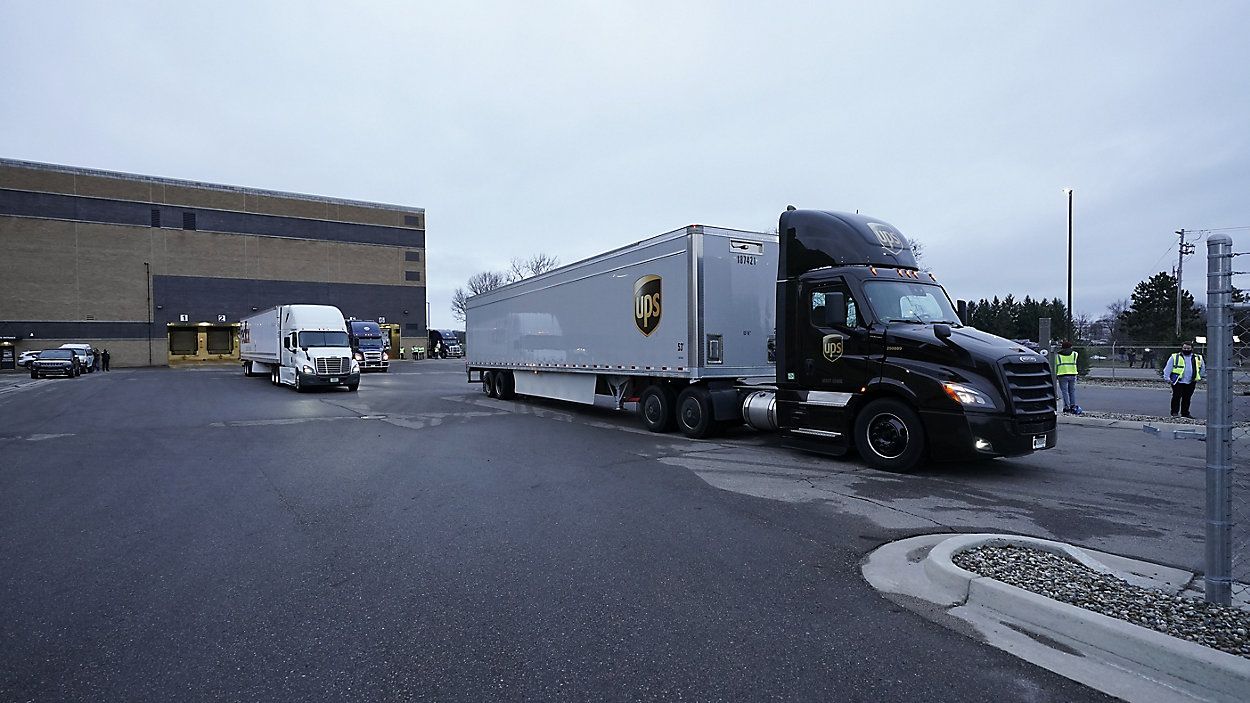LOUISVILLE, Ky. — UPS Worldport received initial shipments of Moderna's COVID-19 vaccine Sunday morning, one week after approval and distribution of Pfizer's vaccine.
What You Need To Know
- Distribution of Moderna's COVID-19 vaccine has begun as UPS receive its initial doses Sunday morning
- This is the second vaccine approved for use in the U.S.
- Kentucky is set to receive over 100,000 doses from Moderna over the next two weeks
- Moderna's vaccine is easier to transport and handle than Pfizer's, as it does not require ultra-cold storage
The Moderna vaccine was approved for emergency use in individuals 18 and older by the U.S. Food and Drug Administration (FDA) on Friday.
Sunday's shipment was delivered by a truck driven by Cleveland Francis, a member of UPS's Circle of Honor. That's a group of drivers with at least 25 years of safe driving and no accidents — Francis has been driving for UPS for over 50 years.
UPS has partnered with global pharmaceutical and medical supply distributor McKesson to strengthen distribution of COVID-19 vaccines around the country.
“This is a critically important initiative for UPS, and we are committed to delivering what matters for as long as it takes,” said Carol Tomé, CEO of UPS. “McKesson is a valued UPS Healthcare partner, and we will continue to leverage the strength of our network to safely and efficiently get these life-saving vaccines and supplies to their final destination.”
Gov. Andy Beshear said Moderna has allocated 76,700 doses of the vaccine for delivery throughout Kentucky this week, with 33,800 expected the following week.
The much-needed doses are set to arrive Monday to help combat the latest outbreak of the virus; the country is regularly recording more than 3,000 deaths a day.
“With the availability of two vaccines now for the prevention of COVID-19, the FDA has taken another crucial step in the fight against this global pandemic that is causing vast numbers of hospitalizations and deaths in the United States each day,” said FDA Commissioner Stephen M. Hahn, M.D. said in a statement.
President Trump wrote to Twitter following the emergency authorization: "Congratulations, the Moderna vaccine is now available!"
The vaccine is very similar to the Pfizer-BioNTech that is now being dispensed to millions of health care workers and nursing home residents as the biggest vaccination drive in U.S. history starts to ramp up.
The two work “better than we almost dared to hope,” NIH Director Dr. Francis Collins told The Associated Press. “Science is working here, science has done something amazing.”
Early results of large, still-unfinished studies show both vaccines appear safe and strongly protective although Moderna’s is easier to handle since it doesn’t need to be stored at ultra-frozen temperatures.
A second vaccine represents a ray of hope amid despair as the virus continues to spread unabated even before holiday gatherings that are certain to further fuel the outbreak.
The Moderna vaccine requires two doses given 28 days apart, compared to 21 days for the Pfizer shot.
The six million doses set to go out next week are just the first wave of 200 million doses available to the U.S., enough to vaccinate 100 million people. Health officials purchased another 100 million doses last week and have the option to purchase more according to a contract with the company.
Participants in Moderna’s clinical trial were more likely to have a reaction than people who got the Pfizer vaccine, according to data released by the FDA. Nearly 70 percent reported fatigue and around 60 percent reported a headache and muscle pain, while others reported chills and joint pain.
Experts say that those reactions are a good sign, because they mean your body is reacting to the vaccine properly.
“They are actually side effects of your immune system fighting the virus,” said Dr. Paula Cannon, a virologist and Associate Professor of Microbiology at the University of Southern California’s medical school.
“[They] should be considered like an ‘Oh, good, I’ve got a little bit of a headache.’ That probably means the vaccine is working. It’s doing its job.”
The Associated Press contributed to this report.



